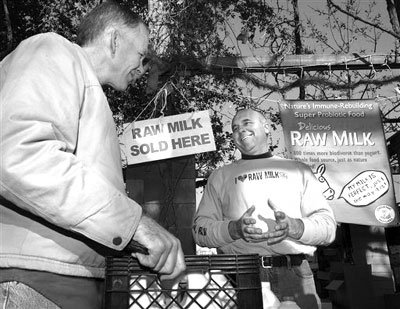California’s two raw milk producers filed a civil suit in San
Benito County court Thursday in hopes of getting a new law
requiring higher bacterial standards for their product declared
unconstitutional.
California’s two raw milk producers filed a civil suit in San Benito County court Thursday in hopes of getting a new law requiring higher bacterial standards for their product declared unconstitutional.
The new rules, signed into law in October, sets a limit on coliform for raw milk. Coliform is naturally occurring bacteria found in the colons of mammals.
Claravale Farm in Paicines and Organic Pastures Dairy Co. in Fresno – the only two raw milk producers in California – filed a joint complaint against the state and the California Department of Food and Agriculture late Thursday afternoon to prevent the law from taking effect.
Bradley Sullivan, a local attorney working with an Ohio-based law firm representing Claravale and Organic Pastures, argued Thursday that not all coliforms are the pathogens that cause illness.
Certain identifiable strains of E. coli, salmonella and campylobacter can cause illness. The complaint contends that pathogens never have been found in either Organic Pastures Dairy Co. or Claravale Farm raw milk in the five and 11 years, respectively, of CDFA testing for each.
Sullivan said the new law would force the dairies to pasteurize milk.
“Or go out of business,” Sullivan said. “They’d probably go out of business.”
The vast majority of consumed milk is pasteurized – effectively eliminating any pathogens.
Jay Van Rein, a spokesman for the CDFA, said he could not comment on the suit because the agency had not been officially notified.
Van Rein did say similar bacteria standards are in place in other states and that the department is ready to begin enforcing the new law Tuesday.
“The coliform bacteria is not a normal component of milk as it’s made by the cow,” said Van Rein, later adding, “Detection in bottled milk is indication of whether or not production and processing are done with high sanitation standards.”
Proponents of raw milk argue it contains many beneficial organisms, enzymes and bacteria, such as Lactoperoxidase, Lactoferrin, Polysaccharides, antibodies, B-lymphocytes, Macrophages, Neutropils, T-lymphocytes, Lysosume, Oligosaccharides, Bifidus factor and Fibronectin.
Pasteurization eliminates such organisms.















